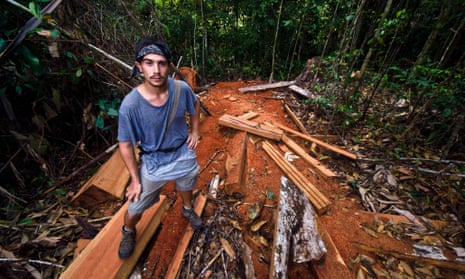A quarter of agricultural goods produced from illegally deforested land are destined for the EU, a new report has found, which estimates their value at more than €6bn (£4.3bn) a year. The investigation by Fern, a Brussels-based forestry NGO, puts the EU ahead of the US and China per capita. More than half of the total value of EU imports of agricultural commodities estimated to be linked to illegal deforestation originates in Brazil, and a quarter originates in Indonesia.
While the figures may be shocking, some campaigners see it as just another example of how the EU ignores the environmental and social problems associated with the low-cost imports its economy depends upon.
Sam Lawson, author of the Fern report and an independent environmental investigator, says: “The EU population would not accept these kinds of illegalities, human rights abuses and environmental damage if it was happening within their borders, so it’s hypocritical to then not care about the influence EU imports has on them [elsewhere].”
Voluntary approach failing
Lawson joins a groundswell of leading NGOs tackling various ethical trade issues who say voluntary guidance is failing to compel European companies to clean up their supply chains or take responsibility for their impacts overseas, and think new EU legislation is needed.
“Promises from big companies are all well and good, but I don’t think the voluntary approach will succeed on its own because of the level of illegality and poor governance involved,” says Lawson. He argues that individual companies can only do so much without the bilateral agreements between the EU and producer countries to support and police them.
Lawson adds: “The regulatory approach taken by the EU on timber has been transformative of the industry and has driven change in a way that the voluntary approach over previous decades was unable to achieve on its own.
“Similar action is needed by the EU on commodities like conflict minerals, clothing from sweatshops and agricultural products.”
In fact, proposed new legislation on conflict minerals – such as tin, tungsten,
tantalum, and gold, whose mining can be linked to funding wars and which are used in electronic goods and jewellery – is going before the European parliament this week.
“Unfortunately, the proposed Conflict Minerals Regulation that the European commission has put on the table is extremely weak and risks undermining a lot of the [UN and OECD] voluntary frameworks it already endorses,” says Michael Gibb of the NGO, Global Witness, which is leading a campaign to clean up the EU’s €123bn (£83bn) mineral trade, the fourth largest in the world.
“There are fears that the EU risks lagging quite far behind progress in other countries, notably the US and 12 countries in Africa, who have recognised the limitations of voluntary frameworks and the need to get companies much more proactively involved in this process through mandatory regulation,” says Gibbs.
He adds: “The EU’s current position is very, very concerning, and makes many European companies, consumers and investors vulnerable to reputational risks by potentially inadvertently funding some very serious abuses.”
Will big business support action?
On cheap labour issues, too, there are frustrations that EU legislation isn’t keeping pace with the rest of the world or even its own member countries. In November, a coalition of NGOs, trade unions and retailers succeeded in getting a transparency clause added to the Modern Slavery bill, which recently received royal assent and compels UK companies to report about what they’re doing to identify and address slavery in their supply chains.
“This is the first legislation of its kind in Europe, but I really think it should be EU-wide,” says Rachel Wilshaw, ethical trade manager at Oxfam, who says the clause was inspired by the California Transparency in Supply Chains Act 2010, which obliges companies with a turnover of more than $100m to take similar measures. “Slavery knows no borders, so it would be far more effective if the same legal pressures to report on supply chains were on all European companies, not just British ones.”
Last month, the EU congratulated itself in its latest State of the Environment Report (pdf) (SOER) for consuming less materials, less non-renewable energy and emitting less greenhouse gases while still managing to increase economic output. But given that household consumption in the EU has increased by a quarter since 1996 and EU imports have doubled in the past decade (pdf), those greener claims are clearly only made possible by effectively outsourcing its environmental footprint to countries outside the eurozone.
“Between 24% and 56% of the associated total footprint occurs outside Europe, with on average 56% of the land footprint associated with products consumed within the EU estimated to lie outside the EU territory,” says the European Environment Agency.
The EU’s recent pledge to cut greenhouse gas emissions by at least 40% by 2030 looks weaker when taking into account emissions embedded in ever-increasing imports.
Campaigners argue that the EU could – and should – be exercising greater domestic powers to encourage better practices beyond its territory and reduce its global footprint.
“What’s needed is a combination of government procurement policy, regulatory requirements on importers for due diligence along their supply chains, and bilateral work with producer countries,” adds Lawson. “If the big companies making ethical promises really want to make a difference, they should throw their weight behind such action by government.”
The social impact hub is funded by Anglo American. All content is editorially independent except for pieces labelled “brought to you by”. Find out more here.
Join the community of sustainability professionals and experts. Become a GSB member to get more stories like this direct to your inbox

Comments (…)
Sign in or create your Guardian account to join the discussion